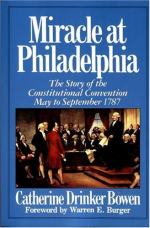
|
| Name: _________________________ | Period: ___________________ |
This quiz consists of 5 multiple choice and 5 short answer questions through Foreigners in Congress. The Ten Miles Square..
Multiple Choice Questions
1. In Chapter Four, what issue does James Wilson see as the heart of the problem surrounding government?
(a) Is it modeled after the British form of government?
(b) Does it represent all states equally?
(c) Is it be over men or over states?
(d) Is it be decided at the Convention?
2. Who is elected the president of the Convention?
(a) Washington.
(b) Morris.
(c) Hamilton.
(d) Madison.
3. In 1787, which American City still shows the effects of the Revolutionary War?
(a) Trenton, New Jersey.
(b) Boston.
(c) New York City.
(d) Philadelphia.
4. Where does the Convention meet?
(a) Washington, D.C..
(b) The Pennsylvania State House.
(c) The White House.
(d) The Congressional buildings.
5. Which delegate argue that restrictions on the citizenship of legislators are left for Congress to decide?
(a) Charles Pinckney.
(b) Edmund Randolph.
(c) James Madison.
(d) Robert Morris.
Short Answer Questions
1. On July second, what question does the delegates vote on?
2. Which article, in the document presented by the Committee of Detail, alarms the Maryland delegates?
3. Why does Franklin believe foreign-born citizens are allowed to serve in Congress?
4. Who founded the Ohio Company and sells shares to congressmen?
5. Who proposes the compromise on representation?
|
This section contains 317 words (approx. 2 pages at 300 words per page) |

|




